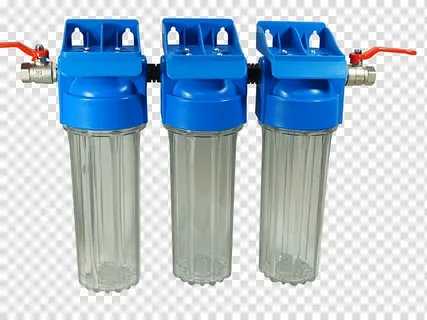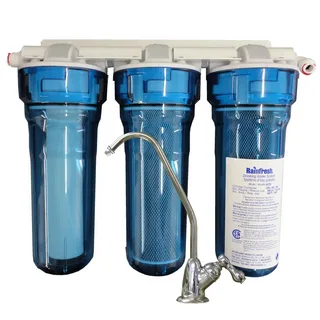Water filters are essential for ensuring that our water is safe and clean. However, it’s crucial to balance purity and the planet when choosing the best water filters for our homes. In this blog post, we will explore the environmental impact of water filters, the hidden costs of single-use options, and how to choose the best eco-friendly Water Filters for your household.
Understanding the Environmental Footprint of Water Filters
While instrumental in providing clean drinking water, water filters carry an environmental burden that often goes unnoticed. The footprint of these filters begins with their production; the materials—primarily plastics—used in manufacturing them are derived from fossil fuels, a non-renewable resource. This process consumes energy and emits greenhouse gases, contributing to climate change. Furthermore, the lifespan of a water filter is relatively short, leading to frequent replacements and, consequently, more waste.
The disposal of used filters is another concern, as many are not biodegradable or recyclable, leading to an accumulation of plastic waste in landfills and oceans. Some filters also contain activated carbon and other substances that, if not properly disposed of, can introduce pollutants into the environment.
This production, use, and disposal cycle underscores the importance of considering the environmental impact of water filters beyond their immediate benefit of purification. It highlights the necessity for manufacturers and consumers to prioritize sustainability in the design, use, and disposal of water filtration products to mitigate their ecological footprint.
 The Hidden Costs of Single-Use Water Filters
The Hidden Costs of Single-Use Water Filters
Single-use water filters, often chosen for their convenience and perceived initial low cost, present several less obvious drawbacks that can accumulate significant environmental and financial burdens over time. While the immediate appeal of not having to clean or replace parts may seem advantageous, this choice leads to a continuous cycle of purchasing and disposing of these products, which can be both economically inefficient and environmentally detrimental.
The production of single-use water filters consumes valuable resources, including water and fossil fuels, and results in the emission of greenhouse gases. After their brief lifespan, these filters contribute to the growing problem of plastic waste in our landfills and oceans, as they are predominantly made from non-biodegradable materials. The environmental cost of manufacturing, distributing, and disposing of single-use filters extends far beyond the price tag, affecting ecosystems and contributing to the depletion of natural resources.
Economically, the frequent replacement required by single-use filters means a higher long-term cost for consumers. The price of continually buying these filters can surpass the cost of more sustainable, long-lasting alternatives within just a few months or years, depending on water consumption rates. Additionally, the hidden costs extend to the broader societal expense of managing plastic waste and mitigating its environmental impacts, which can have far-reaching consequences for public health and global ecosystems.
Reusable vs. Disposable Water Filter for Home: A Comparative Analysis
In the debate between reusable and disposable Water Filter for Home, each type presents distinct advantages and challenges, especially from an environmental perspective. Reusable filters are characterized by their long-term use, where the main body of the filter remains intact, and only the filtering medium or cartridge needs periodic replacement. This approach significantly reduces waste, as the main component of the filter can last for many years, minimizing the contribution to landfills and the demand for new plastic production. Additionally, the manufacturing energy and resources are amortized over a longer period, making reusable filters more resource-efficient over their lifecycle.
Conversely, disposable water filters are designed for a single-use cycle. After their filtering capacity is exhausted, the entire unit is discarded, leading to higher volumes of waste. While they offer convenience, their environmental toll is higher due to the continual need for replacement, which perpetuates the cycle of plastic production, consumption, and disposal. This contributes to landfill waste and the depletion of natural resources used in the manufacturing process.
The choice between reusable and disposable water filters hinges on environmental impact, convenience, and long-term cost-effectiveness considerations. While disposable filters may offer immediate ease of use, reusable filters stand out as the more sustainable option, aligning with efforts to reduce plastic waste and conserve natural resources. The shift towards reusable water filtration systems reflects a growing awareness of and responsibility for our environmental footprint, encouraging a more thoughtful approach to everyday consumption choices.
How to Choose the Best Eco-Friendly Water Filter for Your Home
Material Considerations
Selecting the ideal eco-friendly water filter involves examining the materials used in its manufacture. Opt for filters made from recycled or sustainably sourced materials. This choice ensures that the filter’s production has a reduced environmental impact.
Durability and Longevity
Durability is crucial when choosing an eco-friendly water filter. Long-lasting filters decrease the need for frequent replacements, thereby reducing waste. Investing in a durable filter contributes to sustainability by lowering the overall consumption of resources.
Disposal and Recycling
Investigate the filter’s disposal process. Determine if the filter is recyclable or if the manufacturer offers a take-back program. These options ensure that the filter can be disposed of responsibly, minimizing environmental harm.
Filtration Technology
Assess the filtration technology used. Prefer advanced systems that maximize filter longevity and efficiency without relying heavily on plastic components. Some filters incorporate biodegradable materials or designs that reduce the use of consumable parts, making them more eco-friendly.
Energy Consumption
Consider the energy consumption of the filter. Filters that require less energy contribute to a smaller carbon footprint, aligning with eco-conscious objectives. Energy-efficient filters help in reducing overall environmental impact.
Company Sustainability Practices
Evaluate the company’s commitment to sustainability. Investigate whether they implement environmentally friendly practices in their production and shipping processes. Companies dedicated to sustainability are likely to produce products that align with eco-friendly values.
The Role of Technology in Advancing Eco-Friendly Best Water Purifier
Innovative developments in Best Water Purifier are pivotal in enhancing environmental sustainability. As technology evolves, so do the methods and materials used in water filters, with a growing emphasis on reducing ecological footprints. Modern advancements have introduced filters that leverage cutting-edge purification methods, such as advanced adsorption techniques and nanotechnology, to extend filter life and minimize waste. Moreover, integrating materials from renewable sources or fully biodegradable materials marks a significant shift towards greener alternatives.
In addition to material innovation, technology has facilitated the creation of energy-efficient filtration systems. These systems are designed to require less power, thus lowering greenhouse gas emissions associated with electricity consumption. Smart filters have also emerged, equipped with sensors and connectivity to monitor filter health and water quality, ensuring optimal performance without unnecessary replacements. This conserves resources and reduces the environmental impact associated with manufacturing and disposing of filters.
Research and development efforts to discover new, sustainable filtration technologies further support the drive towards eco-friendly water filtration. These efforts promise a future where water purity and environmental responsibility go hand in hand, highlighting technology’s integral role in achieving these goals.
Making a Sustainable Choice: The Impact beyond the Home
When you opt for an eco-friendly water filter, your decision echoes beyond the confines of your residence, contributing to a broader societal movement towards sustainability. This choice directly impacts the reduction of environmental pollutants, as it decreases reliance on single-use plastics and mitigates the consumption of fossil fuels associated with the production and disposal of conventional water filters.
By selecting filters that prioritize sustainability, you play a crucial role in conserving natural resources and fostering biodiversity, as less waste means healthier ecosystems in rivers, oceans, and landfills. This decision also influences market demand, encouraging manufacturers to invest in greener technologies and sustainable practices, accelerating the shift towards environmentally responsible products across industries. Furthermore, adopting eco-friendly water filtration solutions promotes public health by reducing potential pollution sources and encouraging the consumption of clean, safe water.
As individuals and communities gravitate towards sustainable living choices, the cumulative effect of these decisions can lead to significant environmental benefits, including cleaner air and water, reduced greenhouse gas emissions, and a more sustainable use of our planet’s finite resources. In essence, by choosing an eco-friendly water filter, you’re not just making a purchase byou’reting a vote for the kind of world you want to live in.
Final Thoughts: The Future of Water Filtration and Environmental Responsibility
Shift towards Sustainable Water Filtration
Embrace the shift towards sustainable water filtration practices by prioritizing the use of filters with minimal environmental impact. Opting for environmentally friendly filtration options helps reduce pollution and promotes a healthier planet.
Support Innovations in Water Filtration Technology
Seek out and support innovations in water filtration technology that offer high efficiency and low ecological footprints. By encouraging the development of greener solutions, we can drive the industry towards more sustainable practices.
Reusable and Recyclable Water Filters
Actively choose reusable and recyclable water filter options to significantly reduce plastic waste and resource consumption. This choice minimizes the environmental footprint associated with single-use filters.
Investment in Renewable Materials
Advocate for and invest in water filtration systems that utilize renewable materials. This commitment to sustainability helps advance eco-friendly practices within the industry and supports the development of sustainable products.
Educating on Eco-Friendly Water Filtration
Educate yourself and others about the benefits of eco-friendly water filtration, including its role in conserving natural resources and promoting healthier ecosystems. Knowledge and awareness can drive more sustainable consumer choices.
Support Transparent Manufacturers
Engage with manufacturers and brands that are transparent about their production processes and environmental policies. Supporting companies committed to reducing their carbon footprint encourages industry-wide changes towards sustainability.
Conclusion
Navigating the vast array of Water Filters options can seem daunting, yet the journey towards selecting an eco-conscious water filter is rewarding. Emphasizing the harmony between maintaining water purity and nurturing our planet demands thoughtful consideration and informed choices. As we’vwe’velored the varying impacts of water filters, from their environmental footprint to the innovative strides toward sustainability, it’sit’sar that our decisions carry weight. Opting for eco-friendly water filtration supports the well-being of our households and contributes to the broader, vital goal of preserving our natural world for future generations. By prioritizing filters that align with these values, we can all play a part in fostering a healthier environment and advancing towards a more sustainable and responsible approach to water purification.
FAQs
Q: Can I find Water Filters that are both effective and environmentally friendly?
A: Yes, water filters on the market combine high filtration efficiency with eco-friendly practices. Look for filters made with sustainable materials, those with a longer lifespan to reduce waste, and models that are recyclable or have parts that can be replaced to minimize their environmental impact.
Q: How often do eco-friendly water filters need to be replaced?
A: The replacement frequency depends on the specific model and water usage. Some eco-friendly filters have longer lifecycles due to advanced filtration technologies and durable designs. Always check the manumanufacturer’sommendations for replacement intervals to ensure optimal performance.
Q: What makes a water filter eco-friendly?
A: Eco-friendly water filters are characterized by several factors, including using sustainable or recycled materials in their construction, energy-efficient operation, a design that minimizes waste by allowing for component replacement instead of complete unit disposal, and options for recycling after their functional life.
| Related Business Listings |
| Contact Directory |
| Local Business Profiles |

